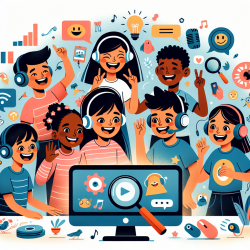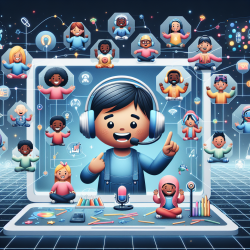Introduction
As practitioners dedicated to improving children's outcomes, it's crucial to stay informed about the latest research and its implications for our work. A recent study titled "Racism hurts, can antiracism heal?: Positive mental health correlates of antiracist engagement" provides valuable insights into how antiracist engagement can positively impact mental health. This blog explores the findings and offers guidance on how practitioners can leverage these insights to enhance their practice.
Understanding the Research
The study conducted by Brannon et al. (2023) examined the mental health impacts of antiracist engagement across various racial and ethnic groups. The research found that involvement in antiracist activities, such as participating in protests or seeking information online, was associated with improved mental health indicators, including reduced anxiety and depression and increased self-rated health.
Key findings from the study include:
- State-level engagement with the Black Lives Matter (BLM) movement, measured by protest numbers and online searches, correlated with positive mental health outcomes.
- Social media analysis revealed that tweets containing antiracist content were linked to higher levels of happiness.
- Antiracist engagement was associated with greater positive emotions and sentiments compared to negative ones.
Implications for Practitioners
For practitioners in speech-language pathology and related fields, these findings underscore the importance of fostering environments that support antiracist engagement. Here are some actionable steps to consider:
- Incorporate Antiracist Content: Integrate discussions and materials that address systemic racism into therapy sessions. This can help children develop a deeper understanding of diversity and inclusion.
- Encourage Community Involvement: Support families and children in participating in community events or initiatives that promote antiracism. This engagement can enhance social connections and well-being.
- Promote Information Seeking: Encourage children and families to seek information about antiracism through books, videos, and online resources. This can empower them with knowledge and foster a sense of agency.
Encouraging Further Research
While the study provides compelling evidence of the benefits of antiracist engagement, further research is needed to explore the mechanisms behind these positive outcomes. Practitioners are encouraged to contribute to this growing body of knowledge by conducting their own research or collaborating with academic institutions.
Conclusion
The findings from this research highlight the potential for antiracist engagement to foster positive mental health outcomes across diverse groups. By integrating these insights into practice, practitioners can contribute to creating more inclusive and supportive environments for children and their families.
To read the original research paper, please follow this link: Racism hurts, can antiracism heal?: Positive mental health correlates of antiracist engagement.










